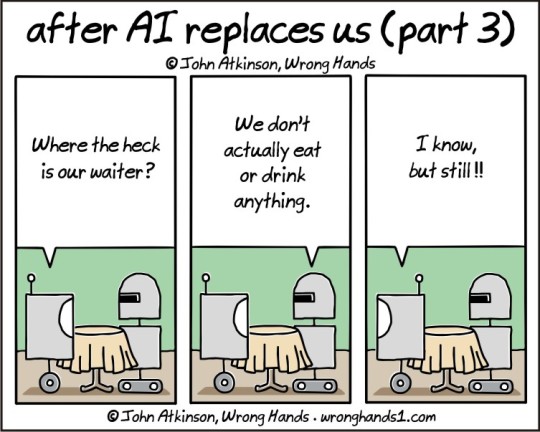#Food Science and Technology
Text
Several benefits of food technology have been effectively transforming the food industry. Keep reading to explore more.
2 notes
·
View notes
Text

Get the post graduate diploma from FFSQ, IGMPI in Food Science and Technology.
#food technology#Food Science and Technology#Diploma in Food Science and Technology programmes#Post Graduate Diploma in Food Science and Technology
0 notes
Text

Oliver Sacks on how chocolate cast its spell upon humanity, from biochemistry to culture.
65 notes
·
View notes
Text

Summer Fling: Captivate and Sparkle with Our Stunning London Blue Topaz Ring
#art#fashion#photography#aesthetic#anime#gif#music#travel#quotes#food#design#nature#comics#vintage#writing#fanart#illustration#beauty#architecture#books#DIY#fitness#gaming#technology#humor#movies#television#science#history#culture
23 notes
·
View notes
Photo

#ai#artificial intelligence#computers#robots#science#science fiction#sci-fi#technology#food#eating#restaurant#wrong hands#john atkinson#webcomic#waiter#humor
212 notes
·
View notes
Text
"If I wanted to convince you of the reality of human progress, of the fact that we as a species have advanced materially, morally, and politically over our time on this planet, I could quote you chapter and verse from a thick stack of development statistics.
I could tell you that a little more than 200 years ago, nearly half of all children born died before they reached their 15th birthday, and that today it’s less than 5 percent globally. I could tell you that in pre-industrial times, starvation was a constant specter and life expectancy was in the 30s at best. [Note: This is average life expectancy, old people did still exist in olden times] I could tell you that at the dawn of the 19th century, barely more than one person in 10 was literate, while today that ratio has been nearly reversed. I could tell you that today is, on average, the best time to be alive in human history.
But that doesn’t mean you’ll be convinced.
In one 2017 Pew poll, a plurality of Americans — people who, perhaps more than anywhere else, are heirs to the benefits of centuries of material and political progress — reported that life was better 50 years ago than it is today. A 2015 survey of thousands of adults in nine rich countries found that 10 percent or fewer believed that the world was getting better. On the internet, a strange nostalgia persists for the supposedly better times before industrialization, when ordinary people supposedly worked less and life was allegedly simpler and healthier. (They didn’t and it wasn’t.)
Looking backward, we imagine a halcyon past that never was; looking forward, it seems to many as if, in the words of young environmental activist Greta Thunberg, “the world is getting more and more grim every day.”
So it’s boom times for doom times. But the apocalyptic mindset that has gripped so many of us not only understates how far we’ve come, but how much further we can still go. The real story of progress today is its remarkable expansion to the rest of the world in recent decades. In 1950, life expectancy in Africa was just 40; today, it’s past 62. Meanwhile more than 1 billion people have moved out of extreme poverty since 1990 alone.
But there’s more to do — much more. That hundreds of millions of people still go without the benefit of electricity or live in states still racked by violence and injustice isn’t so much an indictment of progress as it is an indication that there is still more low-hanging fruit to harvest.
The world hasn’t become a better place for nearly everyone who lives on it because we wished it so. The astounding economic and technological progress made over the past 200 years has been the result of deliberate policies, a drive to invent and innovate, one advance building upon another. And as our material condition improved, so, for the most part, did our morals and politics — not as a side effect, but as a direct consequence. It’s simply easier to be good when the world isn’t zero-sum.
Which isn’t to say that the record of progress is one of unending wins. For every problem it solved — the lack of usable energy in the pre-fossil fuel days, for instance — it often created a new one, like climate change. But just as a primary way climate change is being addressed is through innovation that has drastically reduced the price of clean energy, so progress tends to be the best route to solving the problems that progress itself can create.
The biggest danger we face today, if we care about actually making the future a more perfect place, isn’t that industrial civilization will choke on its own exhaust or that democracy will crumble or that AI will rise up and overthrow us all. It’s that we will cease believing in the one force that raised humanity out of tens of thousands of years of general misery: the very idea of progress.
Changing Humanity's "Normal" Forever
Progress may be about where we’re going, but it’s impossible to understand without returning to where we’ve been. So let’s take a trip back to the foreign country that was the early years of the 19th century.
In 1820, according to data compiled by the historian Michail Moatsos, about three-quarters of the world’s population earned so little that they could not afford even a tiny living space, some heat and, hopefully, enough food to stave off malnutrition.
It was a state that we would now call “extreme poverty,” except that for most people back then, it wasn’t extreme — it was simply life.
What matters here for the story of progress isn’t the fact that the overwhelming majority of humankind lived in destitution. It’s that this was the norm, and had been the norm since essentially… forever. Poverty, illiteracy, premature death — these weren’t problems, as we would come to define them in our time. They were simply the background reality of being human, as largely unchangeable as birth and death itself...
Between 10,000 BCE and 1700, the average global population growth rate was just 0.04 percent per year. And that wasn’t because human beings weren’t having babies. They were simply dying, in great numbers: at birth, giving birth, in childhood from now-preventable diseases, and in young adulthood from now-preventable wars and violence.
It was only with the progress of industrialization that we broke out of [this long cycle], producing enough food to feed the mounting billions, enough scientific breakthroughs to conquer old killers like smallpox and the measles, and enough political advances to dwindle violent death.
Between 1800 and today, our numbers grew from around 1 billion to 8 billion. And that 8 billion aren’t just healthier, richer, and better educated. On average, they can expect to live more than twice as long. The writer Steven Johnson has called this achievement humanity’s “extra life” — but that extra isn’t just the decades that have been added to our lifespans. It’s the extra people that have been added to our numbers. I’m probably one of them, and you probably are too...
The progress we’ve earned has hardly been uninterrupted or perfectly distributed... [But] once we could prove in practice that the lot of humanity didn’t have to be hand-to-mouth existence, we could see that progress could continue to expand.
Current Progress "Flows Overwhelmingly" to the Developing World
The long twentieth century came late to the Global South, but it did get there. Between 1960 and today, India and China, together home to nearly one in every three people alive today, have seen life expectancy rise from 45 to 70 and 33 to 78, respectively. Per-capita GDP over those years rose some 2,600 percent for India and an astounding 13,400 percent for China, with the latter lifting an estimated 800 million people out of extreme poverty.
In the poorer countries of sub-Saharan Africa, progress has been slower and later, but shouldn’t be underestimated. When we see the drastic decline in child mortality — which has fallen since 1990 from 18.1 percent of all children in that region to 7.4 percent in 2021 — or the more than 20 million measles deaths that have been prevented since 2000 in Africa alone, this is progress continuing to happen now, with the benefits overwhelmingly flowing to the poorest among us.
Vanishing Autocracies
In 1800, according to Our World in Data, zero — none, nada, zip — people lived in what we would now classify as a liberal democracy. Just 22 million people — about 2 percent of the global population — lived in what the site classifies as “electoral autocracies,” meaning that what democracy they had was limited, and limited to a subset of the population.
One hundred years later, things weren’t much better — there were actual liberal democracies, but fewer than 1 percent of the world’s population lived in them...
Today just 2 billion people live in countries that are classified as closed autocracies — relatively few legal rights, no real electoral democracy — and most of them are in China...
Expanding Human Rights
All you have to do is roll the clock back a few decades to see the way that rights, on the whole, have been extended wider and wider: to LGBTQ citizens, to people of color, to women. The fundamental fact is that as much as the technological and economic world of 2023 would be unrecognizable to people in 1800, the same is true of the political world.
Nor can you disentangle that political progress from material progress. Take the gradual but definitive emancipation of women. That has been a hard-fought, ongoing battle, chiefly waged by women who saw the inherent unfairness of a male-dominated society.
But it was aided by the invention of labor-saving technologies in the home like washing machines and refrigerators that primarily gave time back to women and made it easier for them to move into the workforce.
These are all examples of the expansion of the circle of moral concern — the enlargement of who and what is considered worthy of respect and rights, from the foundation of the family or tribe all the way to humans around the world (and increasingly non-human animals as well). And it can’t be separated from the hard fact of material progress.
Leaving a Zero-Sum World Behind
The pre-industrial world was a zero-sum one... In a zero-sum world, you advance only at the expense of others, by taking from a set stock, not by adding, which is why wars of conquest between great powers were so common hundreds of years ago, or why homicide between neighbors was so much more frequent in the pre-industrial era.
We have obviously not eradicated violence, including by the state itself. But a society that can produce more of what it needs and wants is one that will be less inclined to fight over what it has, either with its neighbors or with itself. It’s not that the humans of 2023 are necessarily better, more moral, than their ancestors 200 or more years ago. It’s that war and violence cease to make economic sense...
Doomerism, at its heart, may be that exhaustion made manifest.
But just as we need continued advances in clean tech or biosecurity to protect ourselves from some of the existential threats we’ve inadvertently created, so do we need continued progress to address the problems that have been with us always: of want, of freedom, even of mortality. Nothing can dispel the terminal exhaustion that seems endemic in 2023 better than the idea that there is so much more left to do to lift millions out of poverty and misery while protecting the future — which is possible, thanks to the path of the progress we’ve made.
And we’ll know we’re successful if our descendants can one day look back on the present with the same mix of sympathy and relief with which we should look back on our past. How, they’ll wonder, did they ever live like that?"
-via Vox, 3/20/23
Note: I would seriously recommend reading the whole article--because as long as this post is, this is only about half of it! The article contains a lot more information about the hows and whys of human progress, and it also definitely made me cry the first time I read it.
#progress#human rights#humanity#science and technology#premature death#cw infant death#child morality#womens rights#lgbtq rights#bipoc rights#doomerism#climate change#food insecurity#extreme poverty#global south#developing countries#optimism#climate optimism#good news#hope
214 notes
·
View notes
Text









Legend by KAVE music video for anon!
🌡️ 🌡️ 🌡️
🩹 🩹 🩹
🩸 🩸 🩸
#you dont ask questions about project mayhem [boards]#🧼#flashing#blood#slime#technology#glitch#jelly beans#candy#food#buttons#keyboards#television#tv#science#static#white#red#green#black#stim#stim gif#stimboard
8 notes
·
View notes
Text

Edible electronics are being developed to assist rescue operations and go inside hospital patients
Professor Dario Floreano is a Swiss-Italian roboticist and engineer engaged in a bold research venture: the creation of edible robots and digestible electronics.
However counterintuitive it may seem, combining food science and robotic science could yield enormous benefits. These range from airlifts of food to advanced health monitoring.
Boundary breaking
"Our goal is to start replacing electronic parts by edible components," said Floreano, who is director of the Laboratory of Intelligent Systems at the Swiss Federal Institute of Technology in Lausanne.
Read more.
24 notes
·
View notes
Text
ESTUDE O LIVRO UNIVERSO EM DESENCANTO A VERDADEIRA ORIGEM DA HUMANIDADE
7 notes
·
View notes
Text
Intro post
Welcome to ask-Redditblr, your local knockoff r/askreddit blog!
You have thought-provoking questions? You need to find answers, but you are above browsing the deteriorating, capitalistically-run platform that is Reddit?
Then, this blog is for you!
All you have to do is submit your question (or you can send it as an ask IF you can’t find the “Submit a query” button). It will be published unless the post is deemed inappropriate (see rules). Those browsing the blog will do their best to either answer to the best of their abilities (or answer at all if the question calls for an opinion), reblog or tag/mention someone they believe can help you.

Here are the rules:
The “post image” option is enabled for convenience’s sake. Don’t make me regret it (this means no submitting bowluigi smut for laughs)
Please be respectful to each other
Please try to make genuine queries. Joke questions are ok, I just don’t want keysmash in my inbox.
No hate speeches (or racism, sexism, homophobia, yall get the gist)
Any post breaking one of these rules will be removed. Repeat offenders will be blocked. After what number of offenses will be at my discretion since they can vary in severity.
I can’t think of anymore rules, but I may add more if necessary.

If you have any questions or feel like making a suggestion, my askbox is open.
Here’s a list of tags available if you want to tag your posts:
#advice asked
#technology
#fandom
#science
#music
#suggestions asked
#work
#movies
#school
#shopping
#food
#opinions asked
#technology#fandom#science#music#work#movies#school#shopping#food#opinions asked#suggestions asked#advice asked
17 notes
·
View notes
Text
Scientists Unveil Genetically Engineered Chocolate Milk Cow
Scientists have recently unveiled their latest creation, a cow capable of producing chocolate milk straight from the tap. Dubbed the “Hownow Browncow” by delighted researchers, this bovine breakthrough promises to revolutionize the dairy industry and satisfy chocolate cravings in unprecedented ways.
The concept, as ridiculous as it sounds, began as a brainstorming session among a group of…

View On WordPress
#chocolate#chocolate milk#comedy#diet#farm#farmer#farms#Food#funny#Health#humor#milk#satire#science#technology
3 notes
·
View notes
Text

"Outer Banks Season 4 continues the thrilling adventure as our favorite Pogues dive into a dangerous quest for a long-lost treasure. Facing old foes and new adversaries, their friendships, loyalty, and survival skills are put to the test. Amidst adrenaline-pumping escapades, romance blooms and crumbles, leaving destinies forever altered. With breathtaking cinematography and a captivating narrative, Outer Banks Season 4 promises to keep audiences on the edge of their seats."
Click to Watch !!!
Click to Download !!!
#art#fashion#photography#travel#music#design#actors#science#movies#celebrities#sports#hollywood#technology#books and libraries#food#beauty#developers startups#home lifestyle#health fitness#quotes#actors strike#sag strike#sag-aftra#tiktok#chem.thug#i LOVE this#hang it in the louvre#dj crazy times#biljana electronica#history
7 notes
·
View notes
Text
Lab Meat. The $1 Trillion Ugly Truth
youtube
#agriculture#food#bioengineering#biotechnology#environment#nutrition#science#propaganda#biology#technology#food safety#Youtube
8 notes
·
View notes
Text
Things you have to consider when making a healthy/healthier version of a product
cost: (like yes you could use innovative technologies and really good ingredients but what's the point if the final product isn't going to be affordable
bioavailability: You can't just search for a calcium rich source and add it for example spinach has a lot of calcium but is the bioavailability percentage of the calcium in it high? Nope. (You can pair spinach with vit c rich foods for increasing calcium absorption tho. Food pairings is a topic that doesn't get talked about enough)
the effect on sensorial (taste, texture, aroma) and physicochemical properties : if you're replacing for eg. Wheat flour then gluten is also gone & gluten really provides the binding properties to the dough so now you have to add another extra ingredients to provide the binding properties. (Fat and sugar also give different properties to food so when we're replacing them to reduce calories we have to take care that other properties of the food item aren't being affected adversely.) And like you can make a healthier food but if it doesn't taste good, no one's going to buy it.
shelf life: a very important factor in making commercial products is that they must be shelf stable
stored at room temp or not: if your product needs special storage (for eg freezers for ice cream) then it's going to increase the cost and you basically need a cold chain throughout the transport and storage stages
So instead of using 100% of a new ingredient, substitution of it in some percentage helps and it is more efficient, cost effective and feasible.
9 notes
·
View notes
Text

Add a splash of oceanic elegance to your summer style with our breathtaking London Blue Topaz Ring! 💙💍
#art#fashion#photography#aesthetic#anime#gif#music#travel#quotes#food#design#nature#comics#vintage#writing#fanart#illustration#beauty#architecture#books#DIY#fitness#gaming#technology#humor#movies#television#science#history#culture
13 notes
·
View notes
